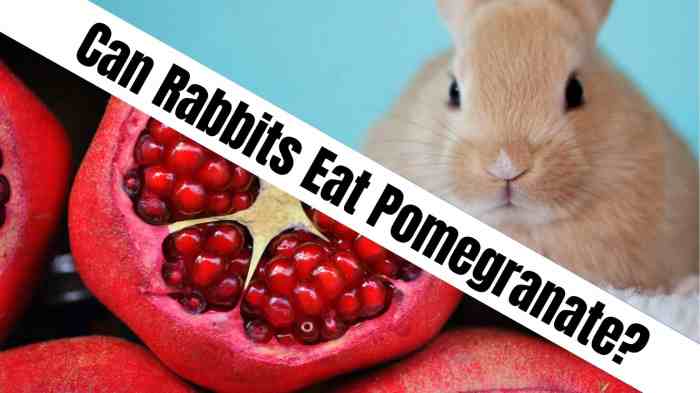Pomegranates are a delicious and nutritious fruit that is enjoyed by many people around the world. But can rabbits eat pomegranates? The answer is yes, rabbits can eat pomegranates, but there are some things you need to keep in mind.
In this article, we will discuss the nutritional value of pomegranates, the benefits and risks of feeding pomegranates to rabbits, and how to feed pomegranates to rabbits safely.
Nutritional Value of Pomegranates
Pomegranates are a nutrient-rich fruit packed with an array of essential vitamins, minerals, and antioxidants. Every 100 grams of pomegranate provides a significant amount of these nutrients, making it a valuable addition to a balanced diet.
The nutritional composition of pomegranates is as follows:
Calories
- Calories: 83
Carbohydrates
- Total carbohydrates: 18.7 grams
- Sugar: 13.66 grams
- Dietary fiber: 5.2 grams
Vitamins
- Vitamin C: 10.2 milligrams
- Vitamin K: 16.4 micrograms
- Vitamin E: 0.9 milligrams
- Folate: 38 micrograms
- Niacin: 0.6 milligrams
- Vitamin B6: 0.1 milligrams
Minerals
- Potassium: 236 milligrams
- Phosphorus: 36 milligrams
- Magnesium: 12 milligrams
- Calcium: 10 milligrams
- Iron: 0.3 milligrams
Benefits of Pomegranates for Rabbits

Pomegranates offer a range of potential health benefits for rabbits due to their rich nutritional content. Their potent antioxidant properties help protect against oxidative stress and cellular damage, contributing to overall health and well-being.
Antioxidant Properties
Pomegranates contain a diverse array of antioxidants, including polyphenols, anthocyanins, and ellagic acid. These compounds combat free radicals, unstable molecules that can damage cells and contribute to chronic diseases. The antioxidant activity of pomegranates has been shown to protect rabbit cells from oxidative stress and inflammation, reducing the risk of various health issues.
Potential Risks of Pomegranates for Rabbits
While pomegranates can provide some nutritional benefits for rabbits, it’s important to be aware of potential risks associated with feeding them this fruit.
Digestive Upset
Rabbits have sensitive digestive systems, and eating large amounts of pomegranates can lead to digestive upset, including diarrhea, bloating, and gas. The high fiber content in pomegranates can be difficult for rabbits to digest, especially if they are not accustomed to eating it.
Sugar Content
Pomegranates are also high in sugar, which can be harmful to rabbits if consumed in excess. Rabbits are prone to developing dental problems, and sugary foods can contribute to the formation of cavities and abscesses.
Potential Toxicity
The seeds of pomegranates contain small amounts of tannins, which can be toxic to rabbits if ingested in large quantities. Tannins can bind to proteins in the digestive tract, making them unavailable for absorption. This can lead to malnutrition and other health problems.
Importance of Moderation
It’s important to feed pomegranates to rabbits in moderation and avoid giving them large amounts at once. A small piece of pomegranate as an occasional treat is unlikely to cause any problems, but excessive consumption should be avoided.
How to Feed Pomegranates to Rabbits
When feeding pomegranates to rabbits, it is essential to prioritize their safety and well-being. Begin by introducing small amounts gradually to prevent digestive upset. The recommended serving size for an adult rabbit is one to two tablespoons of pomegranate arils, once or twice a week.
- Remove the seeds: The seeds can be a choking hazard for rabbits and should be removed before feeding.
- Feed only the arils: The arils are the juicy, fleshy part of the pomegranate that is safe for rabbits to consume.
- Avoid the peel: The peel is tough and can be difficult for rabbits to digest.
- Monitor your rabbit: Observe your rabbit after feeding them pomegranate to ensure they do not experience any adverse reactions.
Alternative Fruits and Vegetables for Rabbits
In addition to pomegranates, there are numerous other fruits and vegetables that are safe and beneficial for rabbits to consume. These alternatives provide a variety of nutrients that contribute to a healthy and balanced diet.
Fruits
- Apples: Rich in fiber, vitamin C, and potassium, apples support digestive health and provide essential vitamins.
- Bananas: High in potassium and fiber, bananas aid in electrolyte balance and promote digestive regularity.
Vegetables
- Carrots: Excellent sources of vitamin A, beta-carotene, and fiber, carrots promote eye health and support a healthy digestive system.
- Leafy greens: Including romaine lettuce, spinach, and kale, leafy greens are packed with vitamins, minerals, and fiber, essential for overall well-being.
When introducing new fruits or vegetables to your rabbit’s diet, start with small amounts and gradually increase the portion as tolerated. Monitor your rabbit for any signs of digestive upset and adjust the amount or frequency of feeding accordingly.
Final Summary
Pomegranates can be a healthy and nutritious treat for rabbits, but it is important to feed them in moderation. If you are unsure whether or not your rabbit can eat pomegranates, it is always best to consult with your veterinarian.
FAQ Section
Can rabbits eat pomegranate seeds?
No, rabbits should not eat pomegranate seeds. The seeds can be a choking hazard and can also cause digestive problems.
How often can I feed my rabbit pomegranate?
You should only feed your rabbit pomegranate once or twice a week. Too much pomegranate can cause digestive problems.
What are some other fruits and vegetables that rabbits can eat?
Rabbits can eat a variety of fruits and vegetables, including apples, bananas, carrots, and leafy greens. These foods are all high in nutrients and can help to keep your rabbit healthy.